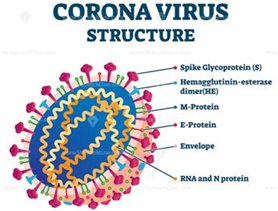Dakshaben developed one side facial weakness within 10 days of being diagnosed with Covid 19 infection. Bharatbhai had sudden weakness of right side of his body with inability to speak and when rushed to the hospital he was diagnosed to have stroke with Covid 19 infection! As per Dr Sucheta Mudgerikar such incidents are occurring frequently in last one and half year when the whole world is reeling under the effect of pandemic caused by SARS-CoV 19 infection. The common understanding is that the infection starts with cough, cold, fever, breathlessness or at times with diarrhoea. However over last one year with better understanding of this infection, we are diagnosing Covid infection in patients presenting with neurological symptoms of headache, seizures, stroke, altered sensorium and neuropathies.
How is the nervous system affected by SARS – CoV 19?
 The corona virus has spikes on its outer surface that has a special glycoprotein . This attaches to specific receptors on the cell surfaceof respiratory tract, lungs, blood vessels, brain cells etc. Its like a lock and key mechanism. It opens up channel of entry of virus into various organs and brain. Dr. Dr. Sucheta Mudgerikar says , Once inside the virus destroys the host cell, replicates itself, and starts an immune reaction in the body which in turn can harm the host system.
The corona virus has spikes on its outer surface that has a special glycoprotein . This attaches to specific receptors on the cell surfaceof respiratory tract, lungs, blood vessels, brain cells etc. Its like a lock and key mechanism. It opens up channel of entry of virus into various organs and brain. Dr. Dr. Sucheta Mudgerikar says , Once inside the virus destroys the host cell, replicates itself, and starts an immune reaction in the body which in turn can harm the host system.
As a result of infection in the lungs, there may be pneumonia or damage to lungs due to blood supply being blocked. This leads to reduced capacity of lungs to exchange CO2 and take in O2. As a result of low oxygen levels, there may be hypoxic damage to the brain in severe cases.
Stroke: the corona virus increases blood viscosity and can damage the inner lining of blood vessels causing clogging of blood vessels and cutting off blood supply to parts of brain. There can be bleeding too. When blood supply is cut off, that part of the brain cannot function and this in turn manifests as one sided weakness or loss of speech, loss of vision, loss of consciousness depending on which part of brain is affected.
</
Meningitis/ encephalitis: Direct infection of the brain can lead to meningitis/Encephalitis , altered sensorium, seizures with fever.
Cranial nerve palsies: Weakness of one half of face with inability to close that eye or sudden hearing loss, double vision can be seen as manifestation of COVID 19 infection as nerves responsible for these functions may temporarily stop functioning.
Peripheral Neuropathy: The virus can trigger an immune reaction and this may damage the myelin insulation cover of nerves of the boy leading to weakness of legs, arms, face, whole body at times. This is described as Guillain Barre Syndrome and with proper treatment it can improve well.
Mucor Mycosis: A secondary infection in patients with – Diabetes or those on immunosuppressant medication for various disorders or those whose immune response is poor– can lead to severe septic encephalopathy or fungal infection of paranasal sinuses that can reach the brain, leading to life threatening situation.
Arterial and venous thrombosis: Thickening of blood is a serious issue in post covid patients as this can block the arteries anywhere in the body, veins of brain/legs or abdomen, and amputation have been necessary at times. Cortical venous sinus thrombosis can cause severe headache, fits, swelling of the brain and hemorrhagic infarcts in the brain.
What precautions can be taken to avoid such complications?
Dr. Sucheta Mudgerikar says Prevention is the best thing and so to avoid getting infected- wear a mask, sanitize or wash hands frequently and maintain social distancing.
If you come in close contact with an infected person, quarantine yourself and observe for fever, body ache, muscle pains etc.
Do not panic or give in to anxiety and avoid following social media self-declared nonqualified advisers.
- Do regular breathing exercises/walking/yoga
- Eat a simple healthy diet
- Drink plenty of water
If you get symptoms of COVID 19, contact a specialist doctor. Quarantine yourself and watch your SPO2 on pulse oxymeter. Inform the doctor if it gets below 94 persistently.
You can detect a stroke by observing
- F: Facial asymmetry/weakness
- A: Arm weakness/leg weakness
- S: Speech problems
- T: Time is of great importance as you need to rush patient to a hospital that treats strokes 24×7, where CT scan facility and neurologist is available who give treatment to dissolve the clot, so that stroke improves rapidly. This process of thrombolysis (clot dissolution) can be done usually just within 4.5 hours of onset of stroke.
- This can be done even in Covid patients who fit the criteria.
Ask your doctor if you need to take blood thinners once you are on treatment for covid infection.
Continue medicines as prescribed. You may need to take some medicines for a longer time, so do not stop them on your own.
Remember that 80% COVID-19 patients are treated at home and get well. So do not panic or spread panic. Keep a healthy lifestyle as that is a key to fast recovery.
Dr. Sucheta Mudgerikar
M.D. (Medicine), D.M. (Neurology)
Consultant Neurologist




